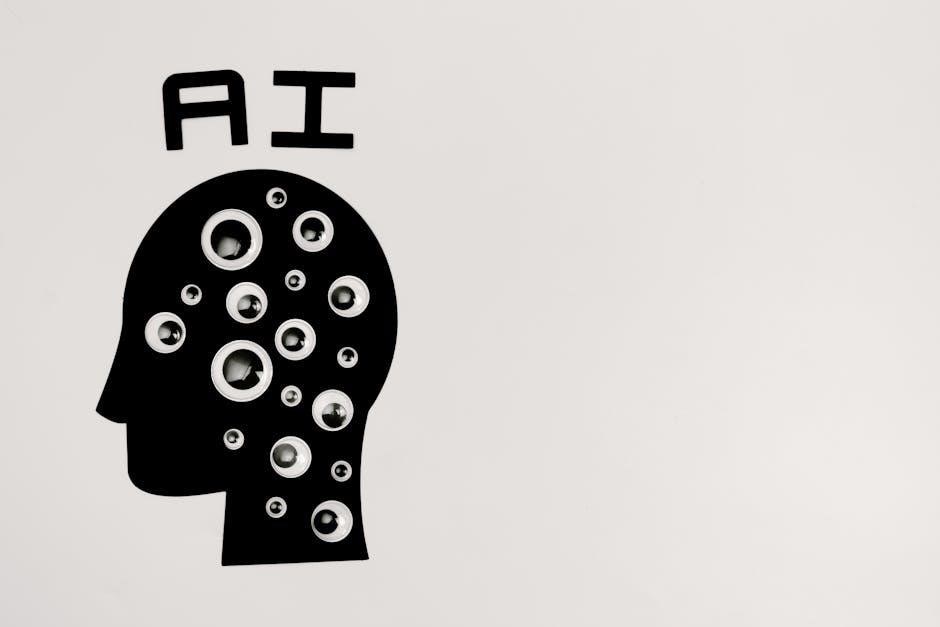decolonising the mind pdf

Ngugi wa Thiong’o’s seminal work‚ Decolonising the Mind‚ explores mental liberation from colonial influences‚ emphasizing language’s role in shaping cultural identity and African literature’s future․
1․1 The Concept of Mental Decolonization
Mental decolonization‚ as explored in Ngugi wa Thiong’o’s Decolonising the Mind‚ refers to the liberation of the mind from the ideological and cultural imprints left by colonialism․ It emphasizes breaking free from the mental shackles imposed by European languages and cultural norms‚ which often marginalize indigenous identities․ Ngugi argues that colonial education systems and the imposition of foreign languages created a disconnect between Africans and their cultural heritage․ This mental colonization perpetuates a subordinate mindset‚ alienating individuals from their history and traditions․ Reclaiming indigenous languages and cultural narratives is central to this process‚ as it restores a sense of self-worth and cultural identity․ Mental decolonization is not just an intellectual exercise but a necessary step toward reclaiming agency and fostering an Afrocentric perspective․ It calls for a conscious rejection of imposed ideologies and a return to indigenous knowledge systems․
1․2 Historical Context of the Book
Decolonising the Mind‚ published in 1986‚ emerges from Ngugi wa Thiong’o’s experiences amidst Kenya’s colonial and postcolonial struggles․ The book reflects the broader context of African nations grappling with independence and cultural identity․ Ngugi’s own upbringing in a colonial Kenya‚ where European languages dominated education‚ deeply influenced his critique of mental colonization․ The Mau Mau rebellion and its aftermath further shaped his understanding of resistance and cultural reclaiming․ Drawing from these historical events‚ Ngugi argues that colonialism’s enduring impact lies in its erosion of indigenous languages and cultural frameworks․ The book‚ written in English‚ became a powerful statement against linguistic imperialism‚ resonating globally․ Its publication coincided with growing debates about postcolonial identity‚ making it a landmark text in African literary and political discourse․ The work remains a testament to the historical struggles of decolonization and the ongoing fight for cultural sovereignty․

Ngugi wa Thiong’o: Background and Contributions
Born on January 5‚ 1938‚ in Kamiriithu‚ Kenya‚ Ngugi wa Thiong’o is a renowned writer and scholar whose work challenges colonialism and advocates for African cultural and linguistic renewal․
2․1 Early Life and Education
Born on January 5‚ 1938‚ in Kamiriithu‚ Kenya‚ Ngugi wa Thiong’o grew up in a Kikuyu-speaking community‚ deeply rooted in African traditions․ His early education began in a local mission school where the medium of instruction was his native Gikuyu language‚ fostering a strong connection to his cultural heritage․ However‚ the Mau Mau uprising and subsequent colonial repression disrupted his childhood‚ exposing him to the harsh realities of colonialism․ Despite these challenges‚ Ngugi’s early exposure to African languages and traditions laid the foundation for his later advocacy for linguistic and cultural decolonization․ His educational journey reflects the broader struggle of African societies under colonial rule‚ shaping his intellectual and literary trajectory․
2․2 Major Works and Their Impact
Ngugi wa Thiong’o’s literary contributions are profound‚ with works like Decolonising the Mind‚ The River Between‚ and Weep Not‚ Child leaving a lasting impact․ Decolonising the Mind critiques colonial language policies and advocates for African languages in literature‚ reshaping postcolonial discourse․ The River Between explores cultural clashes and resistance‚ while Weep Not‚ Child portrays the human cost of colonialism․ These works challenge Eurocentric narratives‚ promoting African identity and linguistic diversity․ Ngugi’s writing not only reflects his experiences but also inspires global conversations on decolonization and cultural sovereignty‚ cementing his legacy as a pioneering voice in African literature․

The Politics of Language in African Literature
The imposition of European languages in Africa marginalized indigenous tongues‚ perpetuating cultural alienation․ Ngugi argues for reclaiming African languages as a form of resistance and liberation․
3․1 European Languages in African Contexts
The dominance of European languages in African contexts has long been a tool of cultural imperialism․ Ngugi wa Thiong’o critiques how these languages were imposed through colonial education systems‚ marginalizing indigenous tongues and disconnecting Africans from their cultural heritage․ The use of English‚ French‚ and Portuguese in literature and governance perpetuated the notion of Western superiority‚ stifling local narratives․ This linguistic hegemony not only affected communication but also shaped identity‚ as African writers often felt compelled to express themselves in foreign languages․ Ngugi argues that this phenomenon reflects a deeper ideological control‚ where the language of the colonizer becomes the lens through which colonized peoples view themselves and their world․ The continued use of European languages in postcolonial Africa thus reinforces mental colonization‚ hindering true cultural and intellectual liberation․
3․2 The Role of Indigenous Languages
Ngugi wa Thiong’o emphasizes the critical role of indigenous languages in decolonizing the mind․ He argues that these languages are vital for cultural identity‚ history‚ and liberation․ Indigenous languages counteract the imposition of European languages‚ which were used to erase African cultures during colonization․ By reclaiming and prioritizing native tongues‚ Africans can reconnect with their heritage and resist the mental domination of colonial ideologies․ Ngugi calls for African writers to create in their native languages‚ asserting that true literary and intellectual freedom can only be achieved through linguistic independence․ He also highlights the importance of education systems that promote indigenous languages‚ as they empower individuals to think critically and authentically․ Ultimately‚ indigenous languages are not just tools of communication but instruments of cultural and political liberation‚ essential for decolonization․
3․3 Language and Cultural Identity
Language plays a pivotal role in shaping cultural identity‚ as it serves as a mirror reflecting a community’s history‚ beliefs‚ and values․ Ngugi wa Thiong’o argues that indigenous languages are deeply intertwined with cultural identity‚ offering a unique lens through which people view the world․ The imposition of European languages during colonization disrupted this connection‚ alienating Africans from their cultural roots and fostering a sense of inferiority․ Reclaiming indigenous languages‚ therefore‚ becomes an act of resistance and self-affirmation․ Ngugi emphasizes that language is not just a tool for communication but a repository of cultural memory and identity․ By valuing and promoting indigenous languages‚ individuals can reconnect with their heritage and challenge the lingering effects of colonialism․ This reconnection fosters authenticity and pride‚ essential for decolonizing the mind and reclaiming cultural sovereignty․

Education and Cultural Imperialism
Colonial education systems imposed European languages and values‚ marginalizing African cultures and perpetuating mental colonization․ This eroded indigenous identity and self-worth‚ as local traditions were deemed inferior․
4․1 The Impact of Colonial Education Systems
Colonial education systems were designed to replace indigenous knowledge with European values‚ creating a disconnect between African students and their cultural heritage․ These systems emphasized the use of European languages‚ marginalizing local tongues and fostering a sense of inferiority․ The curriculum often glorified colonial history while ignoring African achievements‚ leading to a distorted view of self and history․ This mental colonization suppressed critical thinking and creativity‚ as students were conditioned to accept foreign perspectives as superior․ Ngugi highlights how such education perpetuated cultural erasure and mental subjugation‚ making it a tool of imperial control․ The long-term effects included a loss of cultural identity and a reliance on foreign frameworks for understanding the world․
4․2 Mental Colonization and Its Effects
Mental colonization refers to the psychological domination imposed by colonial powers‚ where indigenous cultures and languages were devalued in favor of European norms․ This systemic erasure led to a profound alienation from one’s heritage‚ as Africans internalized the belief in their own inferiority․ The widespread adoption of European languages and educational systems further entrenched this mental subjugation‚ disconnecting people from their cultural roots․ Ngugi emphasizes how this mental colonization perpetuated a cycle of self-doubt and cultural amnesia‚ making it difficult for individuals to reclaim their identities․ The effects were far-reaching‚ manifesting in a loss of confidence in African epistemologies and a reliance on foreign frameworks for understanding and navigating the world․ This psychological impact remains a critical barrier to true decolonization‚ as it hinders the ability to think independently and reaffirm indigenous knowledge systems․

Afrocentricity and Decolonization
Afrocentricity is a philosophy centered on African perspectives and cultural values‚ countering colonial mental frameworks․ It emphasizes African agency and identity‚ fostering liberation from Eurocentric ideologies‚ as highlighted by Ngugi wa Thiong’o․
5․1 Defining Afrocentricity
Afrocentricity is a cultural and intellectual movement that centers African experiences‚ histories‚ and values․ It seeks to reclaim and celebrate African identity‚ challenging Eurocentric narratives that have historically marginalized African perspectives․ This philosophy emphasizes the importance of African languages‚ traditions‚ and knowledge systems in fostering a sense of pride and self-determination․ By prioritizing African voices and worldviews‚ Afrocentricity aims to decolonize the mind and promote a more equitable understanding of global cultures․ It is not merely a rejection of Western influences but a proactive affirmation of African heritage and its contributions to humanity․ Through this lens‚ individuals and communities can reconnect with their roots‚ fostering resilience and empowerment in the face of ongoing colonial legacies․
5․2 Its Role in Decolonizing the Mind
Afrocentricity plays a pivotal role in decolonizing the mind by challenging dominant Eurocentric frameworks․ It encourages individuals to question and reject the internalized beliefs and values imposed by colonialism‚ fostering a mental liberation․ By promoting African languages‚ histories‚ and cultural practices‚ Afrocentricity helps restore a sense of pride and identity․ This shift allows people to view their experiences through an African lens‚ rather than one shaped by colonial ideologies․ Through education and cultural reclamation‚ Afrocentricity empowers individuals to break free from mental colonization․ It also promotes a more inclusive understanding of global cultures‚ emphasizing the richness and diversity of African contributions․ Ultimately‚ Afrocentricity serves as a powerful tool for reclaiming agency and fostering a decolonized mindset‚ essential for personal and collective liberation․

The Role of African Languages in Decolonization
African languages are vital tools for liberation‚ challenging colonial linguistic dominance and fostering cultural restoration․ They reconnect communities to their heritage‚ promoting self-expression and identity․
6․1 Language as a Tool for Liberation
Language serves as a powerful tool for liberation‚ enabling African communities to reclaim their cultural identities and resist colonial imposition․ By prioritizing indigenous languages‚ individuals can break free from mental colonization‚ fostering a sense of autonomy and pride․ Ngugi wa Thiong’o emphasizes that language is not just a means of communication but a carrier of history‚ values‚ and knowledge․ When African languages are revitalized‚ they become instruments of empowerment‚ challenging the dominance of European languages inherited from colonialism․ This linguistic revival promotes self-expression and decolonization‚ allowing people to reconnect with their heritage and shape their own narratives․ Ultimately‚ language liberation is central to the broader struggle for cultural and political independence․
6․2 Challenges in Promoting African Languages
Promoting African languages faces significant challenges‚ rooted in colonial legacies and modern realities․ Many African languages lack standardized forms‚ limiting their use in education and governance․ Additionally‚ global dominance of European languages often marginalizes indigenous tongues‚ perpetuating mental colonization․ Limited resources‚ such as textbooks and trained educators‚ further hinder their adoption․ Ngugi wa Thiong’o highlights how colonial education systems devalued African languages‚ creating a preference for foreign ones․ Cultural and political barriers also exist‚ as some view African languages as inferior or impractical for modern needs․ These challenges underscore the need for intentional efforts to revitalize and integrate African languages into all sectors‚ ensuring their survival and relevance in a globalized world․ Addressing these issues is crucial for true decolonization and cultural empowerment․

The Significance of the Decolonising the Mind PDF
The Decolonising the Mind PDF is a vital resource‚ offering accessible insights into Ngugi wa Thiong’o’s arguments on language‚ culture‚ and mental liberation‚ inspiring global academic and cultural discussions․
7․1 Key Themes and Arguments
The Decolonising the Mind PDF delves into the central theme of mental decolonization‚ arguing that African minds were colonized through language and education․ Ngugi wa Thiong’o asserts that European languages imposed during colonialism perpetuated cultural erasure‚ silencing indigenous voices․ He advocates for a return to African languages as a means of reclaiming cultural identity and resisting neocolonialism․ The PDF emphasizes the need to challenge Eurocentric narratives and promote African literature in local languages․ Ngugi’s arguments are deeply rooted in his personal experiences‚ such as his early education in Kenya‚ where the suppression of his native Gikuyu language symbolized broader colonial strategies․ By highlighting these themes‚ the PDF serves as a powerful call to action‚ urging Africans to reclaim their linguistic and cultural heritage․
7․2 Importance in Academic Circles
The Decolonising the Mind PDF holds significant importance in academic circles as a foundational text in postcolonial studies‚ influencing scholars globally․ Its exploration of language‚ culture‚ and power dynamics has reshaped debates on identity and colonialism․ Academics praise Ngugi’s critique of Eurocentric education systems and his advocacy for African languages․ The PDF is widely used in universities‚ inspiring research on decolonization and cultural reclamation․ Its interdisciplinary appeal attracts scholars from literature‚ sociology‚ and education‚ fostering critical discussions on mental liberation․ The work’s impact extends beyond Africa‚ resonating with marginalized communities worldwide․ Its availability in PDF format has democratized access‚ enabling global engagement․ This text remains a cornerstone in academic discourse‚ challenging dominant narratives and inspiring new perspectives on decolonization․

Practical Steps to Decolonize the Mind
Reclaiming indigenous languages and promoting African literature are essential steps․ Overcoming colonial influences and fostering cultural identity are vital for mental liberation․
8;1 Reclaiming Indigenous Languages
Reclaiming indigenous languages is a critical step in decolonizing the mind‚ as emphasized by Ngugi wa Thiong’o․ These languages are not just tools for communication but also repositories of cultural identity and history․ The suppression of indigenous languages during colonial rule led to a disconnection from African heritage‚ perpetuating mental colonization․ By revitalizing and promoting these languages‚ individuals can reconnect with their cultural roots‚ fostering a sense of pride and self-worth․ Ngugi himself advocated for writing in his native Gikuyu‚ challenging the dominance of European languages in African literature․ This act of linguistic reclamation is a powerful form of resistance against colonial legacies․ It also encourages a shift in education systems‚ where indigenous languages are valued and integrated into curricula․ Ultimately‚ reclaiming indigenous languages is a vital process in breaking free from the mental shackles imposed by colonialism and reclaiming African identity․ This step is foundational to the broader project of decolonization․
8․2 Promoting African Literature
Promoting African literature is essential for decolonizing the mind‚ as it challenges the dominance of Eurocentric narratives and celebrates African voices․ Ngugi wa Thiong’o advocates for literature written in indigenous languages‚ asserting that it fosters cultural pride and authenticity․ By prioritizing African stories‚ themes‚ and perspectives‚ literature becomes a tool for reclaiming identity and resisting colonial influences․ This promotion also involves supporting local authors and publishers‚ creating platforms for their work to reach global audiences․ Education systems should integrate African literature into curricula‚ ensuring future generations engage with their cultural heritage․ Furthermore‚ translating African works into other languages can broaden their impact‚ fostering cross-cultural understanding and appreciation․ Through these efforts‚ African literature becomes a powerful medium for mental liberation‚ empowering individuals to think critically and embrace their cultural roots․ This collective effort is vital for sustaining decolonization and promoting a richer‚ more inclusive literary landscape․

The Book’s Journey and Publication History
Decolonising the Mind was first published in 1986 by Heinemann Educational in London and East African Publishers in Nairobi‚ receiving widespread acclaim for its powerful critique of colonialism;

9․1 Initial Reception and Reviews
The publication of Decolonising the Mind in 1986 sparked significant academic and literary discourse․ Critics praised Ngugi’s bold critique of colonialism and his advocacy for African languages․ The book was hailed as a revolutionary work‚ resonating with scholars and activists alike․ Reviewers noted its accessibility‚ making complex ideas about language and identity understandable to a broad audience․ Some highlighted its relevance to postcolonial studies‚ while others appreciated its call to action for cultural liberation․ Despite its controversial themes‚ the book received positive reviews in major literary circles‚ solidifying Ngugi’s status as a leading voice in African literature․ Its impact was immediate‚ inspiring debates and further scholarship on language‚ culture‚ and decolonization․ The book’s initial reception underscored its importance as a foundational text in postcolonial studies․
9․2 Long-term Impact and Legacy
Decolonising the Mind has left an indelible mark on postcolonial studies and African literature․ Its critique of colonialism and advocacy for indigenous languages reshaped academic discourse‚ inspiring scholars to explore language’s role in identity and power․ The book challenged Eurocentric narratives‚ fostering a deeper appreciation for African cultural heritage․ Ngugi’s call for linguistic liberation continues to influence writers and educators‚ promoting the use of African languages in literature and education․ Over decades‚ the text has remained a foundational resource‚ sparking debates and inspiring new generations of thinkers․ Its legacy lies in its ability to transcend academia‚ resonating with broader movements for cultural decolonization globally․ Today‚ Decolonising the Mind is celebrated as a pioneering work that continues to illuminate pathways for mental and cultural liberation․
Decolonising the Mind remains a powerful call for mental liberation‚ inspiring future generations to reclaim cultural identity and challenge colonial legacies through language and literature․
10․1 Continued Relevance in Modern Times
Ngūgī wa Thiong’o’s Decolonising the Mind remains a vital text in contemporary discussions on cultural identity and imperialism․ Its exploration of language‚ power‚ and mental liberation resonates deeply in today’s globalized world․ The book’s themes of resisting Eurocentric narratives and reclaiming indigenous cultures are increasingly relevant as societies grapple with issues of diversity‚ inclusivity‚ and postcolonial identity․ Even decades after its publication‚ the PDF version of the book circulates widely‚ ensuring its ideas reach new generations of scholars‚ activists‚ and readers․ The digital age has amplified its impact‚ making it a cornerstone of decolonial thought in academic and public discourse․ Ngūgī’s call to decolonize the mind continues to inspire movements for cultural sovereignty and linguistic diversity‚ proving its enduring relevance in addressing the complexities of modern times․
10․2 Inspiring Future Generations
Ngūgī wa Thiong’o’s Decolonising the Mind continues to inspire future generations by challenging them to rethink their relationship with language‚ culture‚ and identity․ The book serves as a foundational text in postcolonial studies‚ encouraging young scholars and activists to question dominant narratives and reclaim their cultural heritage․ Its emphasis on the power of indigenous languages and literatures resonates with a new generation of writers‚ educators‚ and thinkers․ The availability of the Decolonising the Mind PDF has made it accessible to a global audience‚ ensuring its ideas reach and influence young people worldwide․ By advocating for mental liberation and cultural sovereignty‚ Ngūgī’s work empowers future generations to resist cultural imperialism and forge their own paths‚ fostering a legacy of resilience‚ creativity‚ and intellectual freedom․ His ideas remain a powerful catalyst for change in an ever-evolving world․